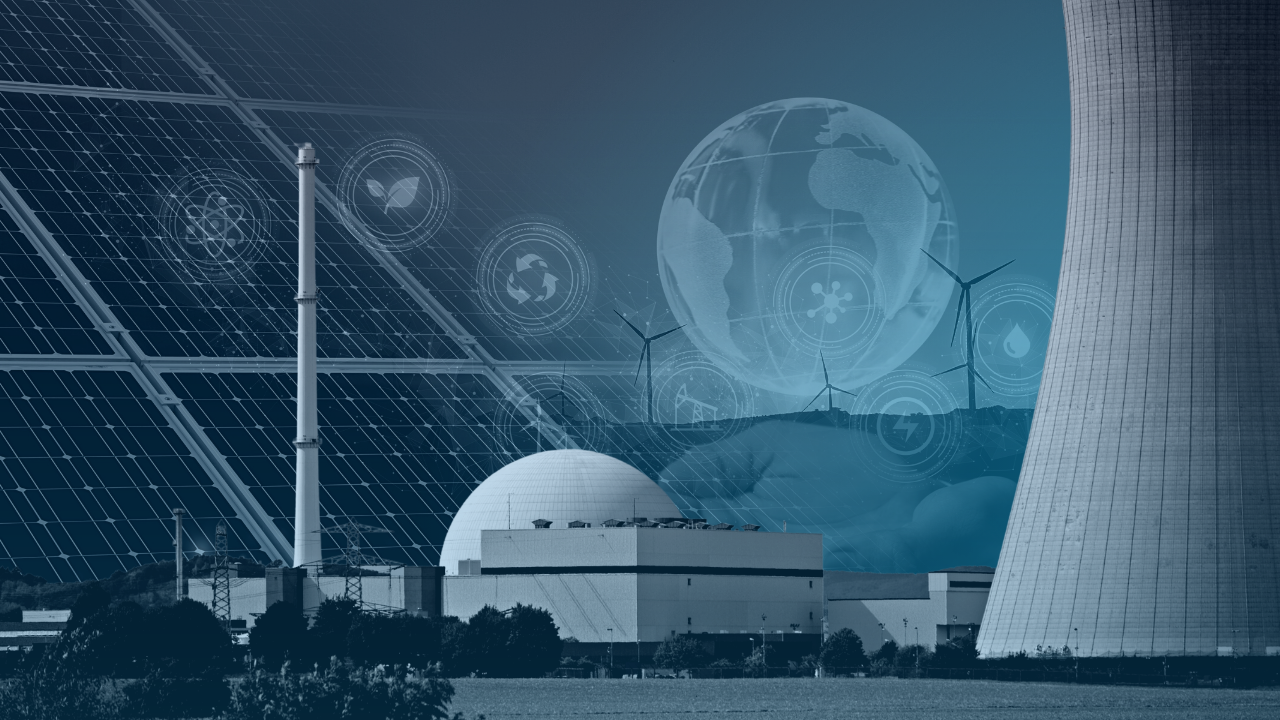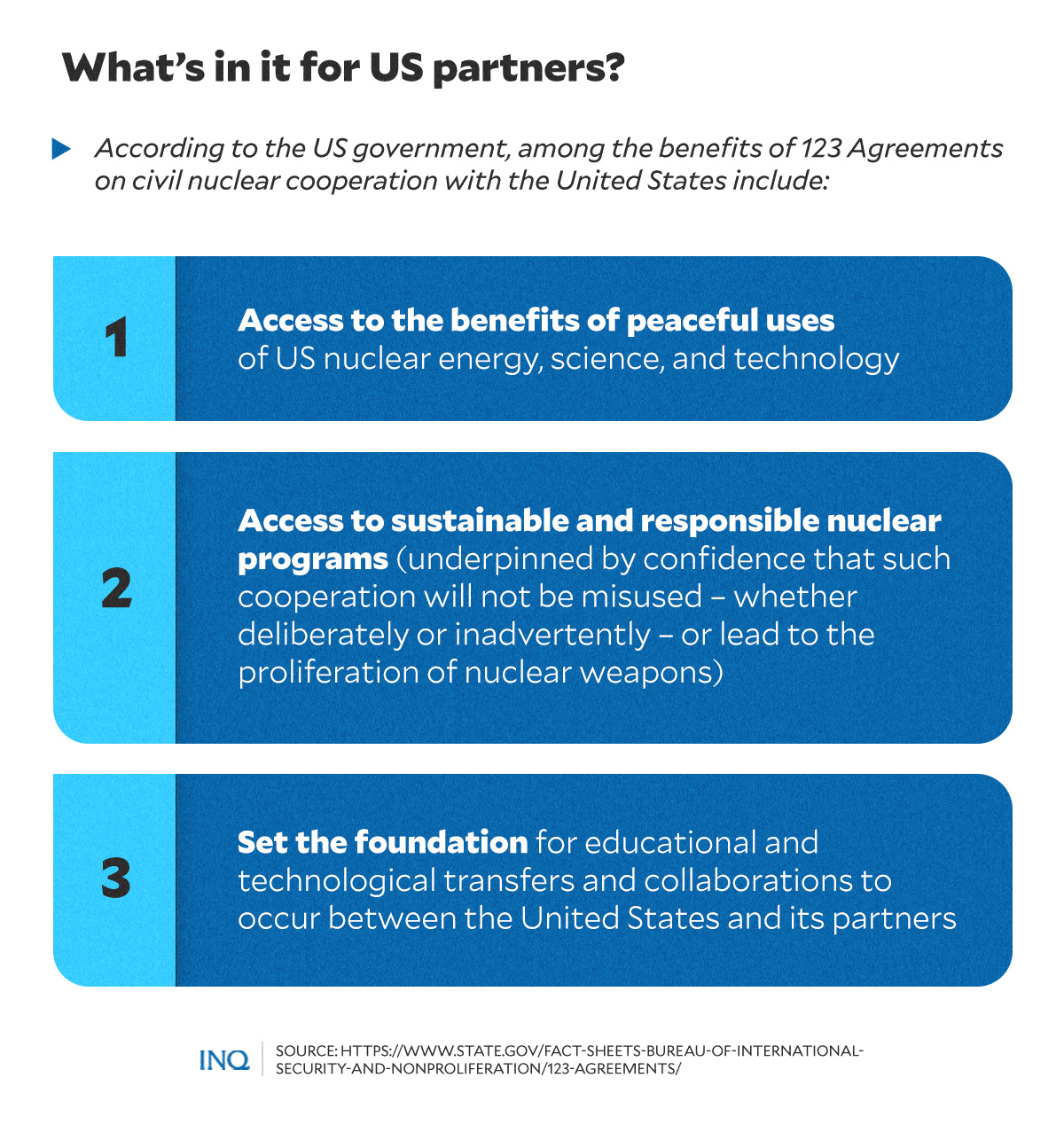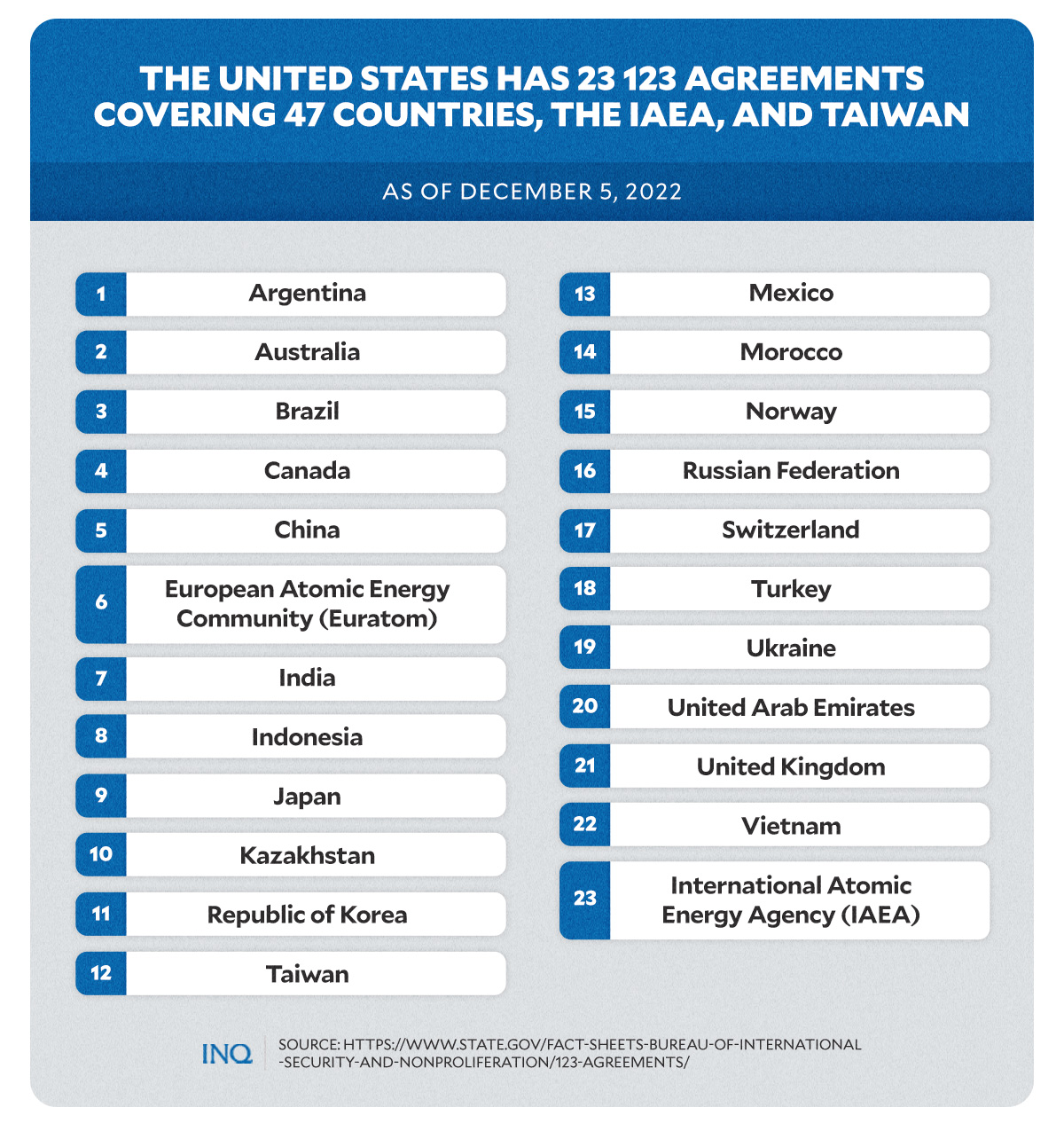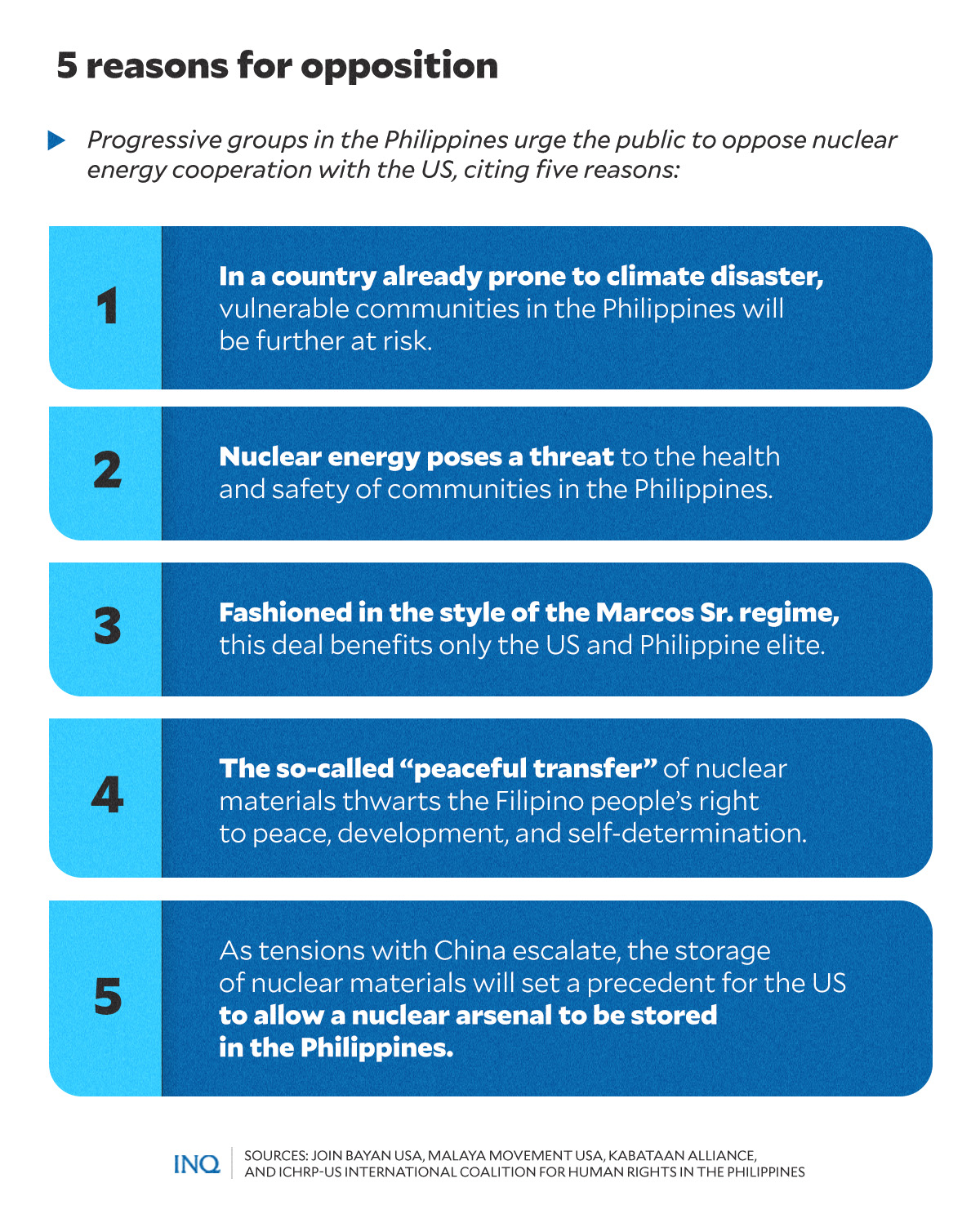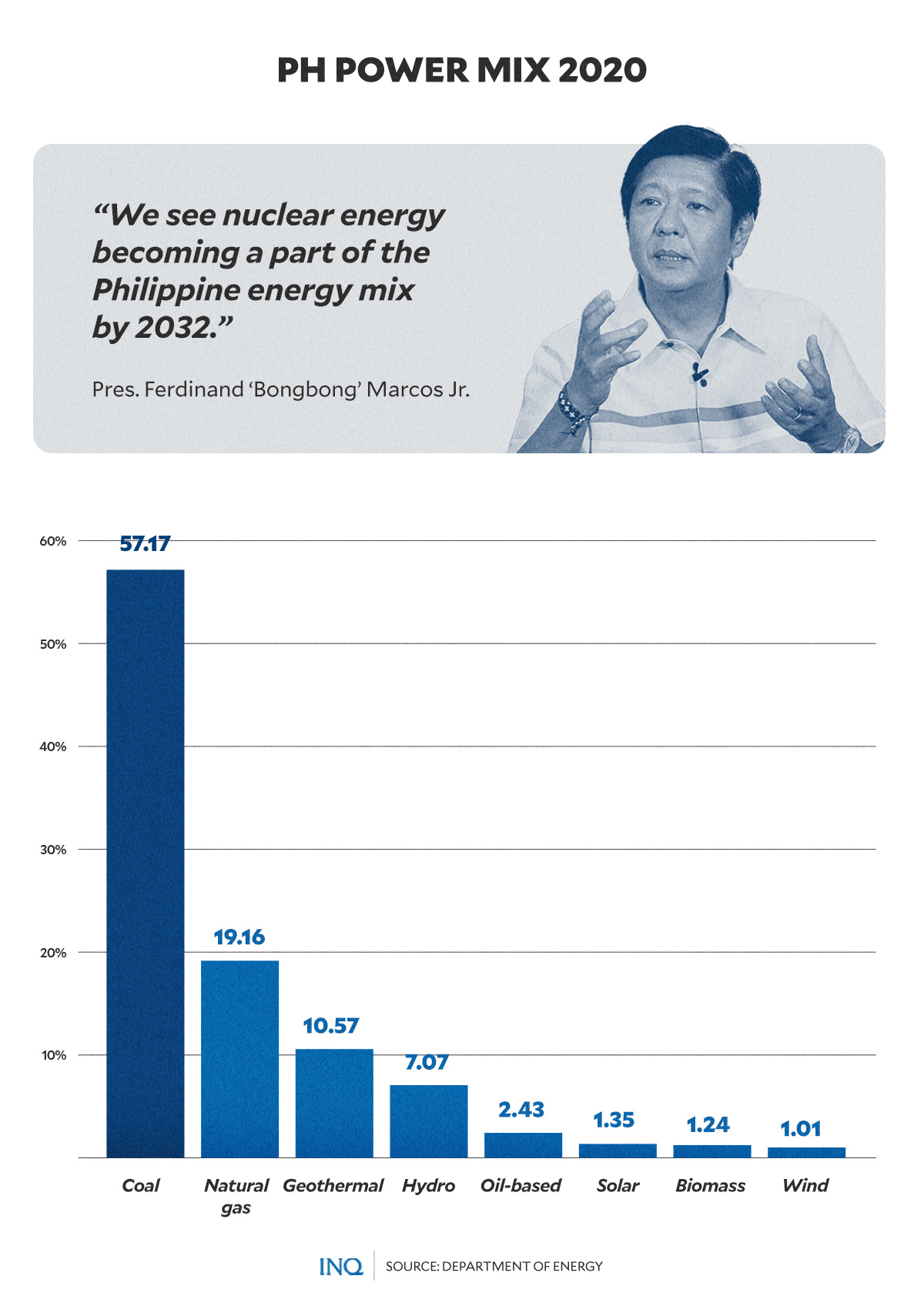Nuclear energy in PH? Group says there’s not even a Filipino expert on safety, radiation
MANILA, Philippines—In a convergence of scientific and environmental dissent, progressive groups, scientists, and climate activists expressed strong opposition to the newly signed nuclear deal between the Philippines and the United States (US).
Last Nov. 17, Energy Secretary Raphael Lotilla and US Secretary of State Anthony Blinken signed the 123 agreement, or the “peaceful nuclear cooperation agreement,” on the sidelines of the Asia-Pacific Cooperation (Apec) Summit.
READ: Nuclear energy pact with PH the ‘fastest’ negotiated by US
It took a year to negotiate the breakthrough agreement between the two countries. Blinken described it as “the fastest that the United States has ever negotiated this kind of agreement.”
The deal, which awaits approval by the US Congress, establishes a legally binding framework allowing the transfer of nuclear material and the export of nuclear fuel, reactors, and equipment from the US to the Philippines.
While it is believed to harness nuclear energy that will be useful for the Philippines government’s agriculture and health projects, a group of Filipino scientists and advocates, progressive groups, and a coalition working with vulnerable sectors and communities campaigning for climate justice slammed the deal and refuted its supposed benefits.
Article continues after this advertisementA ‘reckless decision’
The group Advocates of Science and Technology for the People (AGHAM) said the government’s decision to “impulsively” enter into the agreement was a “reckless decision that lacks careful consideration.”
Article continues after this advertisementThe group explained that despite its promised and expected benefits, there is still no detailed study on whether nuclear power is necessary and appropriate for the country.
“President Ferdinand Marcos Jr. and his allies have hastily signed the 123 nuclear agreement, neglecting the crucial step of conducting a comprehensive feasibility study,” said AGHAM.
“This omission leaves the Marcos administration without a solid foundation to justify their nuclear aspirations, as the International Atomic Energy Agency (IAEA) emphasizes the importance of such studies in assessing a country’s needs and potential for nuclear energy,” the group added.
AGHAM argued that nuclear energy will only worsen the energy crisis in the country, where, according to the group, other indigenous sources of energy remain largely untapped or with inefficient and incomplete distribution systems.
It also described the agreement as “dangerously premature,” considering that the science and technology sector in the country remains severely underfunded and understaffed.
“To illustrate, as of this moment, there is no Filipino expert in nuclear safety or in radiological environmental impact assessment in the country,” the group explained.
“This means that we will have to disproportionately rely on the US nuclear regulatory mechanism, which will lead to us being clueless guinea pigs for their new nuclear technologies; since we do not have our own way of technically assessing future implementations.”
Not a solution for clean energy security
President Ferdinand “Bongbong” Marcos Jr., who witnessed the signing of the pact, said the deal would ensure a “more energy secure and green Philippines.”
“We see nuclear energy becoming a part of the Philippine energy mix by 2032, and we would be more than happy to pursue this path with the United States as one of our partners,” said Marcos Jr. in a speech.
“The signing of the Philippines-United States Agreement for Cooperation Concerning Peaceful Uses of Nuclear Energy, or the 123 Agreement, is the first major step in this regard, taking our cooperation on capacity building further and actually opening the doors for U.S. companies to invest and participate in nuclear power projects in the country,” he added.
However, according to the Philippine Movement for Climate Justice (PMCJ), the 123 Agreement poses a threat by acquiring risky nuclear technologies, misleadingly promoted as a remedy for clean energy security.
“[T]he agreement’s purported benefits are debunked. Nuclear energy, touted for clean energy, releases pollutants worsening the planet’s temperature. The resulting radioactive waste persists for years, often irresponsibly dumped or stored, lacking proper technology for disposal,” PMCJ said in a statement.
PMCJ said that it “vehemently opposes nuclear energy in the country, advocating for a shift towards sustainable solutions.”
READ: Climate activists oppose nuclear energy as Marcos signs deal at APEC
Oppose nuclear deal
According to the US government, among the benefits of the 123 Agreements on civil nuclear cooperation with the United States include:
- access to the benefits of peaceful uses of United States nuclear energy, science, and technology
- access to sustainable and responsible nuclear programs (underpinned by confidence that such cooperation will not be misused – whether deliberately or inadvertently – or lead to the proliferation of nuclear weapons)
- set the foundation for educational and technological transfers and collaborations to occur between the United States and its partners
As of December 5, 2022, the United States has 23 123 Agreements covering 47 countries, the International Atomic Energy Agency (IAEA), and Taiwan.
Philippine Ambassador to the United States Jose Manuel Romualdez added that the deal will “set the tone” on how quickly the Philippines can get nuclear technology from the US. He also noted that the agreement will help jumpstart the nuclear program of the Department of Energy (DOE).
“That’s the most important alternative energy that we’re looking at because once we have that going, we can put that all over the Philippines, and energy costs will start going down,” said Romualdez.
The DOE meanwhile said the accord will enable nuclear energy cooperation between the two countries, which can be used in agriculture and health projects.
“Beyond nuclear power applications to combat climate change, the new Agreement facilitates cooperation in a wide array of other peaceful uses of atomic energy — all supportive of various Sustainable Development Goals,” said Lotilla.
READ: PH-US nuclear energy deal to be used in peaceful agri, health projects – DOE
Despite these supposed benefits, the International Coalition for Human Rights in the Philippines (ICHRP-US), along with progressive groups — Bayan USA, Malaya Movement USA, Kabataan Alliance — demanded that members of the US Congress halt the nuclear deal, citing five reasons:
- In a country already prone to climate disaster, vulnerable communities in the Philippines will be further at risk.
- Nuclear energy poses a threat to the health and safety of communities in the Philippines.
- Fashioned in the style of the Marcos Sr. regime, this deal benefits only the US and Philippine elite.
- The so-called “peaceful transfer” of nuclear materials thwarts the Filipino people’s right to peace, development, and self-determination.
- As tensions with China escalate, the storage of nuclear materials will set a precedent for the US to allow a nuclear arsenal to be stored in the Philippines.
Renewable vs nuclear energy
Both PMCJ and AGHAM questioned Marcos Jr. and his administration’s plans to use more renewable energy while also pushing for the use of nuclear power.
Throughout the campaign period, Marcos has been pushing to increase and further develop the country’s renewable energy sources—including wind and solar power, hydropower, geothermal, and biomass or biofuels—in response to climate change.
READ: Bongbong Marcos ‘dedicated’ to more sustainable, renewable energy in PH — envoy
In his second State of the Nation Address (SONA) last July, Marcos described renewable energy as “the way forward.”
“We are aggressively promoting renewables, so that it provides a 35 percent share in the power mix by 2030, and then on to 50 percent by 2040. To accelerate the realization of this green energy goal, we have opened renewable energy projects to foreign investments,” Marcos Jr. said.
Philippine power plants are currently heavily reliant on coal, using what is considered to be the world’s dirtiest fuel for almost half of energy production.
During the same month, the President called on the private sector to invest in the building of more renewable energy plants in the country to help address the rising demand for electricity at the same time provide consumers with clean sources of power.
READ: Bongbong Marcos pushes for more investments in clean energy
The President, however, has also expressed support and interest in the use of nuclear energy.
“All efforts to increase the number of power sources lean towards clean energy,” Marcos told American business leaders in August this year.
“That being the case, I am interested in the potential of nuclear energy, especially in light of new technologies and innovations that allow the use of smaller scale, modular, nuclear reactors, and other advanced [reactors] technologies that we see as being safer and more efficient than the more traditional designs of nuclear power production,” he added.
READ: Bongbong Marcos eyes nuclear energy to avert possible PH power crisis
According to the PMCJ, the recently signed 123 Agreement exposes the current administration’s lack of seriousness in promoting renewable energy and addressing power supply issues.
“Marcos Jr.’s supposed commitment to improving the energy sector by using nuclear energy is nothing but a facade to fool the public into believing that this is the answer to the energy crisis,” AGHAM added.
“As with his other policies, this will just be an edifice to be used as a talking point for the purposes of extending the Marcoses’ cling to power; with no real positive contribution, and even potentially dangerous, to the Filipino people,” the group continued.
Environmental group Greenpeace Philippines has previously called out Marcos Jr. for showing mixed signals on his stance on energy.
“He used renewable energy when he ran for president, and continues to talk about it like he means it, but it’s all a game of pretend. If you look at his actions, he’s actually out to promote nuclear energy and fossil gas–both of which will block major RE development,” said Greenpeace Philippines country director Lea Guerrero.
“Greenpeace believes this is climate hypocrisy at its most dangerous,” she added.
